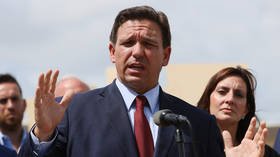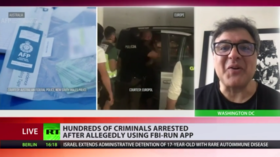Florida education board draws flak for banning ‘critical race theory,’ after state governor calls it a waste of ‘taxpayer dollars’

Florida’s education board has kicked off a storm after unanimously adopting new rules that forbid instructors from trying to “indoctrinate” students and teaching topics like “critical race theory” that “distort historical events.”
The rule change came at a contentious meeting on Thursday, at which state Governor Ron DeSantis made a virtual appearance and argued that such “toxic” theories teach children that “the country is rotten and that our institutions are illegitimate.”
Noting that critical race theory (CRT) exacerbates “divisions”, DeSantis told the meeting it was not worth spending taxpayer money teaching students to judge themselves and others on the basis of race and not “the content of their character” and “what they’re trying to accomplish in life.”
According to the amended rules, topics of instruction must be “factual and objective.” CRT was found to be inconsistent with this standard, as it holds that “racism is not merely the product of prejudice, but that racism is embedded in American society and its legal systems in order to uphold the supremacy of white persons.”
In a later tweeted statement, DeSantis described CRT as “state-sanctioned racism.” It echoed language used by states such as Oklahoma, Idaho, and Tennessee that have previously enacted legislation banning the teaching of race- and racism-related concepts that “inherently divide” people.
Florida’s education system exists to create opportunity for our children. Critical Race Theory teaches kids to hate our country and to hate each other. It is state-sanctioned racism and has no place in Florida schools. pic.twitter.com/ludv7ARgNP
— Ron DeSantis (@GovRonDeSantis) June 10, 2021
The amendment also explicitly forbids the use of material that defines US history as being derived from anything other than the “universal principles stated in the Declaration of Independence.”
Mandating instruction on the US Constitution and the Bill of Rights, it specifically barred teachers from exploring the 1619 Project – an initiative that seeks to approach US nationhood from the perspective of it having been a land built on slavery.
The biggest change— it more clearly provides what historical events should be taught in Florida’s public schools including slavery, the Civil War, and contributions of people of color. But— now directly addresses critical race theory and forbids it. pic.twitter.com/VbuPQL1Hf9
— Forrest Saunders (@FBSaunders) June 10, 2021
“Rather than talking about the policy changes necessary to enable all our students to succeed, these politicians create boogeymen and use Florida’s public schools as a political football,” tweeted Andrew Spar, head of the Florida Education Association teachers’ union.
The meeting saw members of the audience protest about the rule change, with calls to “allow teachers to teach the truth” being raised during the time permitted for public comments.
That call was taken up on social media, several users flooding DeSantis’ account with critical reactions and comments. Many queried the governor’s understanding of CRT, with some people even offering up their explanations of the concept to aid his understanding.
Also on rt.com Georgia governor urges Board of Education to not teach ‘DANGEROUS ideology’ of critical race theory“Critical race theory is not an ideology or a political orientation that assumes white people are bad; it assumes white supremacy is bad in all of its forms. It’s a practice or approach that provides language and a lens for examining racism at institutional and structural levels,” one user tweeted.
Other commenters suggested the rule change was a method to “sanitize” problematic episodes of American history such as slavery, and the Jim Crow laws and customs once used to restrict black Americans’ rights from the late 19th century until 1965.
You can’t even define CRT. So a rule is being proposed today that will sanitize the way slavery, the civil war, the Holocaust, the Indian removal act, Jim Crow and reconstruction are taught in Florida schools. God forbid you tell kids the truth.
— SurgTechGirl (@RobsStew) June 10, 2021
Nonetheless, the amended rules refer to historical events like the Holocaust, slavery, the Civil War and Reconstruction, and the civil rights movement as “significant.”
However, several people voiced support for the new rule, with one person commenting that CRT was a “tool to launder any toxic leftist idea into an academic setting.” Another user noted the tendency of “liberals” to “haphazardly label people they disagree with as extremist,” which made it “easy to see” why the rule change was needed.
A number of commenters, meanwhile, dismissed the raging debate about CRT as a “distraction” from other issues that might better explain societal inequities.
It’s a distraction. We should be dissecting this in strict economic terms, in so doing, shedding light on actual historical context [ex. Red Lining] that actually explains such disparities—instead of this omnipresent, parasitic whiteness being espoused currently. pic.twitter.com/CeXCGSC3VC
— Phil Weis (@WeisPhil) June 10, 2021
If you like this story, share it with a friend!














